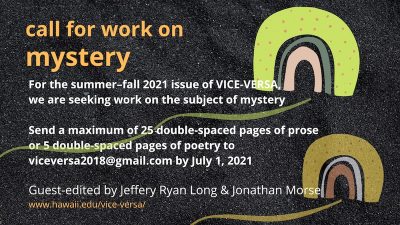One of the mysteries not covered in this issue of Vice-Versa is how an issue is assembled. As many other publications do, we ask people we know to send us their work and we post announcements on social media.

Two of the writers who responded to our posting on Twitter were Zoe C. Sims and Sloane Angelou, new to our pages.
Zoe C. Sims is originally from Kona, on the Big Island. She studied writing and environmental science while in college and is now living in Honolulu, where she works in environmental policy. Her poetry in this issue of Vice-Versa articulates a knowledge of the natural world of Hawai‘i and human and geological time. She writes surely and sensitively about the porousness of poetry, knowledge, and the materials out of which we make science and art.
Sloane Angelou is a writer from West Africa whose poem in this issue is concise in its telling but epic in its evocation of history and landscape. The music in the lines suggests ballads, lullabies, laments, and the repetition evokes the sound of the inevitable that wafts around us. Striking out and creating a future that a person can live in requires greater fortitude when bereft of family and home, and “the third coming” is resonant with loss and hope.
Nights on B Street, a collaboration between artist Adam LeBlanc and poet Joseph Stanton, was installed in Gallery ‘Iolani, the Windward Community College gallery, during the pandemic last year. Joe recently wrote to me and mentioned the exhibit, providing links to the wonderful video and UH News article on it. The more I learned about Nights, the more I felt the project might fit in this issue while allowing us to reach viewers whom Joe and Adam hadn’t because of the pandemic. Our presentation includes photos that zoom in and out of the vibrant and intimate scenes on B Street.
“Klara Konversant” was partly the result of my writer friend Phyllis Young reading Kazuo Ishiguro’s latest novel and recommending it. We’d both read The Buried Giant and were excited when we learned of Klara and the Sun from an interview Ishiguro did with The Guardian. “For me,” Phyllis wrote, “the story is a meditation on intelligence, human as much as artificial—how it develops over time, how important observation and attention are, how our capabilities and limitations affect it, how our attention and experience shape it.” Persuaded by her admiration for Klara, I suggested to Gary Mawyer and Alex Mawyer that we read it. In the conversation that resulted, we talked about many of Klara’s elements while leaving alone certain plot developments. We didn’t intend for our dialogue to be published, but I’m hoping that our observations—and the extracts added later—will give people a sense of the profound mystery at the center of Ishiguro’s book.
Fiction writers Angela Nishimoto, who lives and teaches in Hawai‘i, and Marianne Villanueva, who was born in the Philippines and now lives in California, have stories about men whose passions seek to control them. Both writers have published work in the Ms. Aligned series of fiction, poetry, and nonfiction by women about men. Angela’s story explores dangerous outcomes of toxic masculinity, including assault and murder, by presenting the fantasies of a middle-aged man about a young community-college student. In Marianne’s story “Josefina,” a father is haunted by the belief that his failure to understand his daughter has contributed to her death.
Mahalo to Jeffery Ryan Long for serving as this issue’s fiction editor. Jeff has been featured in previous issues of Vice-Versa, as well as other literary journals. His short-story collection, University and King, was published in 2014. His jazz show, Feel, has had a four-year run on KTUH-FM, the student-managed radio station of the University of Hawai‘i; the last show will be broadcast on Wednesday, Sept. 15. About the VV theme this time, Jeff says,
True knowledge is only an assumption, refuted again and again by the unexplained. In the gap between one fact and the next resides mystery.
In this issue we invite readers to sink themselves into those gaps, into the questions that go unanswered.
Pat Matsueda
